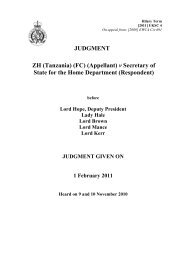The Rugby Football Union (Respondent) v Consolidated Information ...
The Rugby Football Union (Respondent) v Consolidated Information ...
The Rugby Football Union (Respondent) v Consolidated Information ...
Create successful ePaper yourself
Turn your PDF publications into a flip-book with our unique Google optimized e-Paper software.
JUDGMENT<br />
Michaelmas Term<br />
[2012] UKSC 55<br />
On appeal from: [2011] EWCA Civ 1585<br />
<strong>The</strong> <strong>Rugby</strong> <strong>Football</strong> <strong>Union</strong> (<strong>Respondent</strong>) v<br />
<strong>Consolidated</strong> <strong>Information</strong> Services Limited<br />
(Formerly Viagogo Limited) (In Liquidation)<br />
(Appellant)<br />
before<br />
Lord Phillips<br />
Lady Hale<br />
Lord Kerr<br />
Lord Clarke<br />
Lord Reed<br />
JUDGMENT GIVEN ON<br />
21 November 2012<br />
Heard on 14 June 2012
Appellant <strong>Respondent</strong><br />
Martin Howe QC Lord Pannick QC<br />
Tom Moody-Stuart James Segan<br />
(Instructed by Lewis<br />
Silkin LLP)<br />
(Instructed by Kerman &<br />
Co LLP)
LORD KERR (with whom Lord Phillips, Lady Hale, Lord Clarke and Lord<br />
Reed agree)<br />
1. <strong>The</strong> <strong>Rugby</strong> <strong>Football</strong> <strong>Union</strong> (the RFU) is the governing body for rugby<br />
union in England. It owns the famous Twickenham stadium, the home ground of<br />
the England rugby football team. <strong>The</strong> RFU alone is responsible for issuing tickets<br />
for international and other rugby matches played at the stadium.<br />
2. As one would expect in light of the growing popularity of rugby union<br />
football, demand for tickets for home international games at Twickenham<br />
regularly greatly outstrips the number of tickets available, notwithstanding that the<br />
stadium has a capacity of 82,000. <strong>The</strong> RFU does not allow this circumstance to<br />
inflate the cost of tickets, however. On the contrary, it is their deliberate policy to<br />
allocate tickets so as to develop the sport of rugby and enhance its popularity.<br />
Most tickets for international matches are therefore distributed by the RFU to<br />
participants in the sport, via affiliated rugby clubs, referee societies, schools and<br />
other bodies which organise rugby. <strong>The</strong> distribution of the tickets thereafter<br />
depends on the nature of the body in question. Schools, for instance, are permitted<br />
to distribute tickets to "any member of staff, pupil or genuine sponsor”. Member<br />
clubs are permitted to sell some or all of their ticket allocation (up to a combined<br />
maximum of 4,837 tickets per match across all member clubs) to official licensed<br />
operators who then use those tickets to provide official hospitality packages. <strong>The</strong><br />
RFU's share of the profit from this goes towards the player accident and liability<br />
insurance scheme.<br />
3. <strong>The</strong> RFU's terms and conditions stipulate that any resale of a ticket or any<br />
advertisement of a ticket for sale at above face value will constitute a breach of<br />
contract rendering the ticket null and void, so that all rights evidenced by the ticket<br />
are extinguished. Applicants for tickets indicate agreement to these terms and<br />
conditions when submitting ticket application forms and the condition is printed on<br />
the tickets themselves. <strong>The</strong> terms on which tickets are supplied also include a<br />
condition that the ticket remains the property of the RFU at all times.<br />
4. <strong>Consolidated</strong> <strong>Information</strong> Systems Limited, a firm in liquidation, was<br />
formerly known as Viagogo Limited (Viagogo). Viagogo operated a website<br />
which provided the opportunity for visitors to the site to buy tickets online for a<br />
number of different sporting and other events at various venues. Included among<br />
these were tickets for rugby matches at Twickenham. <strong>The</strong> way in which these<br />
transactions took place was that prospective sellers of tickets could use the website<br />
to register tickets that they intended to sell and interested purchasers could then<br />
Page 2
uy the tickets from those who wished to sell them. <strong>The</strong> website provided a means<br />
by which persons were able anonymously to sell event tickets at the going market<br />
price. A price based on “current market data” was suggested by Viagogo's website<br />
to potential sellers when they registered a ticket for sale. Viagogo received a<br />
percentage of the price paid for the ticket.<br />
5. <strong>The</strong> website carried a privacy policy. This was accessed through a link at<br />
the bottom of the website page. It was accompanied by the words, “Use of this<br />
website constitutes acceptance of the Terms and Conditions and Privacy Policy”.<br />
<strong>The</strong> privacy policy was also brought to the attention of a prospective seller when<br />
he registered on the site.<br />
<strong>The</strong> steps taken by the RFU to protect its policy<br />
6. <strong>The</strong> RFU contends that arguable wrongs are involved in the advertisement<br />
and sale of tickets at above face value through the website. <strong>The</strong> sale of tickets at<br />
above face value, it is argued, impinges directly on the RFU’s policy of promoting<br />
the sport of rugby by allowing tickets to be sold at affordable prices. It is no longer<br />
disputed that the sale of tickets in the manner facilitated by Viagogo’s website<br />
arguably constitutes an actionable wrong.<br />
7. Previously, the RFU has sought injunctions against ticket touts and<br />
unlicensed corporate hospitality providers who were selling tickets in breach of the<br />
conditions on which tickets had been supplied. It has also taken disciplinary action<br />
against clubs that had distributed tickets other than as stipulated by the conditions.<br />
In order to take these actions, of course, the RFU had to discover the identity of the<br />
individuals or clubs involved in the sale of the tickets. It engaged in a system of<br />
monitoring the websites of secondary sellers of tickets in an attempt to discover<br />
whether tickets were being sold above face value and, if so, by whom. This effort<br />
was frustrated in many instances, however, because of the anonymity offered by<br />
websites including that of Viagogo.<br />
8. In the run-up to the autumn international rugby matches in 2010 and the<br />
home matches for the six-nations tournament in 2011, the RFU not only continued<br />
to monitor websites, including Viagogo’s, it also conducted a series of test<br />
purchases from the Viagogo website. It discovered that Viagogo had been used to<br />
advertise thousands of tickets for the seven games that were to be played at<br />
Twickenham. Tickets with a face value of £20 to £55 were being advertised for<br />
sale at up to some £1,300. Blocks of tickets up to 24 were offered for sale.<br />
Page 3
9. On making these discoveries, the RFU’s legal advisers wrote to Viagogo<br />
seeking information about the identity of those involved in the sale and purchase<br />
of the tickets. This was resisted. <strong>The</strong> RFU therefore issued proceedings seeking the<br />
disclosure of the information which it considered was required in order to take the<br />
action that it considered was necessary to protect its policy in relation to the sale of<br />
the tickets.<br />
<strong>The</strong> proceedings<br />
10. On 21 March 2011 the RFU issued proceedings seeking disclosure, under<br />
the Norwich Pharmacal principles, of the identity of those who had advertised for<br />
sale or sold tickets for the autumn international and six nations matches.<br />
Tugendhat J acceded to the application, finding that there was a good arguable<br />
case that those who had received tickets from the RFU and the subsequent sellers<br />
and buyers of the tickets had been guilty of breach of contract and/or conversion<br />
[2011] EWHC 764 (QB). He also held that those who entered the stadium by use<br />
of a ticket obtained in contravention of RFU conditions were arguably guilty of<br />
trespass. <strong>The</strong> judge found that the RFU was seeking redress for these arguable<br />
wrongs by obtaining the order that it had applied for; that the information was<br />
necessary to achieve that redress; and that it was appropriate to exercise his<br />
discretion to grant the relief sought.<br />
11. Viagogo appealed the judge’s order. A short time before the hearing of the<br />
appeal, it sought and was granted leave to introduce a new ground for resisting the<br />
grant of a Norwich Pharmacal order. This was to the effect that the making of such<br />
an order would constitute an unnecessary and disproportionate interference with<br />
the rights of those who, arguably, were wrongdoers. Those rights derived from<br />
article 8 of the Charter of Fundamental Rights of the European <strong>Union</strong> which<br />
guarantees the protection of personal data.<br />
12. <strong>The</strong> Court of Appeal dismissed Viagogo’s appeal [2011] EWCA Civ 1585.<br />
It confirmed the findings of Tugendhat J that the RFU had an arguable case on the<br />
ground of breach of contract and trespass. It decided that the RFU had no readily<br />
available alternative means of discovering who the possible wrongdoers were other<br />
than by means of a Norwich Pharmacal order. On the argument that such an order<br />
would constitute unacceptable interference with the personal data rights of those<br />
involved in the sale and purchase of the tickets, the Court of Appeal held that such<br />
interference as would be involved by the issue of the order was proportionate in<br />
light of the RFU’s legitimate objective in obtaining redress for the arguable<br />
wrongs.<br />
Page 4
13. Before this court, the appellant’s argument was effectively confined to the<br />
claim that the grant of the order would involve a breach of article 8 of the Charter.<br />
<strong>The</strong> Norwich Pharmacal order<br />
14. <strong>The</strong> jurisdiction to allow a prospective claimant to obtain information in<br />
order to seek redress for an arguable wrong was recognised by the House of Lords<br />
in Norwich Pharmacal Co v Customs and Excise Commissioners [1974] AC 133.<br />
Its scope was described by Lord Reid at p 175:<br />
“... if through no fault of his own a person gets mixed up in the<br />
tortious acts of others so as to facilitate their wrong-doing he may<br />
incur no personal liability but he comes under a duty to assist the<br />
person who has been wronged by giving him full information and<br />
disclosing the identity of the wrongdoers. I do not think that it<br />
matters whether he became so mixed up by voluntary action on his<br />
part or because it was his duty to do what he did. It may be that if<br />
this causes him expense the person seeking the information ought to<br />
reimburse him. But justice requires that he should co-operate in<br />
righting the wrong if he unwittingly facilitated its perpetration.”<br />
15. Later cases have emphasised the need for flexibility and discretion in<br />
considering whether the remedy should be granted: Ashworth Hospital Authority v<br />
MGN Ltd [2002] 1 WLR 2033, para 57 per Lord Woolf CJ; Koo Golden East<br />
Mongolia v Bank of Nova Scotia [2008] QB 717, paras 37-38 per Lord Clarke MR.<br />
It is not necessary that an applicant intends to bring legal proceedings in respect of<br />
the arguable wrong; any form of redress (for example disciplinary action or the<br />
dismissal of an employee) will suffice to ground an application for the order:<br />
British Steel Corporation v Granada Television Ltd [1981] AC 1096, 1200 per<br />
Lord Fraser of Tullybelton.<br />
16. <strong>The</strong> need to order disclosure will be found to exist only if it is a “necessary<br />
and proportionate response in all the circumstances”: Ashworth at paras 36, 57 per<br />
Lord Woolf CJ. <strong>The</strong> test of necessity does not require the remedy to be one of last<br />
resort: R (Mohamed) v Secretary of State for Foreign and Commonwealth Affairs<br />
(No 1) [2009] 1 WLR 2579, para 94.<br />
17. <strong>The</strong> essential purpose of the remedy is to do justice. This involves the<br />
exercise of discretion by a careful and fair weighing of all relevant factors. Various<br />
factors have been identified in the authorities as relevant. <strong>The</strong>se include: (i) the<br />
strength of the possible cause of action contemplated by the applicant for the<br />
Page 5
order: Norwich Pharmacal at p 199F-G per Lord Cross of Chelsea, Totalise plc v<br />
<strong>The</strong> Motley Fool Ltd [2001] EMLR 750 at first instance para 27 per Owen J, Clift v<br />
Clarke [2011] EWHC 1164 (QB) paras 14, 38 per Sharp J; (ii) the strong public<br />
interest in allowing an applicant to vindicate his legal rights: British Steel at<br />
1175C-D per Lord Wilberforce, Norwich Pharmacal at p 182C-D per Lord Morris<br />
of Borth-y-Gest, 188E-F per Viscount Dilhorne; (iii) whether the making of the<br />
order will deter similar wrongdoing in the future: Ashworth at para 66 per Lord<br />
Woolf CJ; (iv) whether the information could be obtained from another source:<br />
Norwich Pharmacal at 199F-G per Lord Cross, Totalise plc at para 27, President<br />
of the State of Equatorial Guinea v Royal Bank of Scotland International [2006]<br />
UKPC 7 at para 16 per Lord Bingham of Cornhill; (v) whether the respondent to<br />
the application knew or ought to have known that he was facilitating arguable<br />
wrongdoing: British Steel per Lord Fraser at 1197A-B, or was himself a joint<br />
tortfeasor, X Ltd v Morgan-Grampian (Publishers) Ltd [1991] 1 AC 1, 54 per<br />
Lord Lowry; (vi) whether the order might reveal the names of innocent persons as<br />
well as wrongdoers, and if so whether such innocent persons will suffer any harm<br />
as a result: Norwich Pharmacal at 176B-C per Lord Reid; Alfred Crompton<br />
Amusement Machines Ltd v Customs and Excise Commissioners (No 2) [1974] AC<br />
405, 434 per Lord Cross; (vii) the degree of confidentiality of the information<br />
sought: Norwich Pharmacal at 190E-F per Viscount Dilhorne; (viii) the privacy<br />
rights under article 8 of the European Convention for the Protection of Human<br />
Rights and Fundamental Freedoms of the individuals whose identity is to be<br />
disclosed: Totalise plc at para 28; (ix) the rights and freedoms under the EU data<br />
protection regime of the individuals whose identity is to be disclosed: Totalise plc<br />
v <strong>The</strong> Motley Fool Ltd at paras 18-21 per Owen J; (x) the public interest in<br />
maintaining the confidentiality of journalistic sources, as recognised in section 10<br />
of the Contempt of Court Act 1981 and article 10 ECHR: Ashworth at para 2 per<br />
Lord Slynn of Hadley.<br />
18. Many of these factors are self-evidently relevant to the question of whether<br />
the issue of a Norwich Pharmacal order is proportionate in the context of article 8<br />
of the Charter.<br />
<strong>The</strong> Data Protection Directive<br />
19. <strong>The</strong> principal instrument of the EU data protection regime is Directive<br />
95/46/EC (the Directive). Article 1(1) of the Directive provides:<br />
“In accordance with this Directive, Member States shall protect the<br />
fundamental rights and freedoms of natural persons, and in particular<br />
their right to privacy with respect to the processing of personal data.”<br />
Page 6
20. Article 6 of the Directive requires that Member States should make<br />
provision to ensure that personal data is processed fairly and lawfully. <strong>The</strong> concept<br />
of “processing” is wide. <strong>The</strong> regime enacted by the Directive thus applies to<br />
electronic databases as well as hard copy - article 3(1).<br />
21. Article 7 of the Directive prescribes criteria for making data processing<br />
legitimate, stating in relevant part:<br />
“Member States shall provide that personal data may be processed<br />
only if:<br />
(a) the data subject has unambiguously given his consent; or …<br />
(c) processing is necessary for compliance with a legal obligation to<br />
which the controller is subject; or …<br />
(f) processing is necessary for the purposes of the legitimate interests<br />
pursued by the controller or by the third party or parties to whom the<br />
data are disclosed, except where such interests are overridden by the<br />
interests for fundamental rights and freedoms of the data subject<br />
which require protection under Article 1(1).”<br />
22. Article 13 of the Directive deals with exemptions and restrictions. <strong>The</strong><br />
relevant provisions for present purposes are these:<br />
“(1) Member States may adopt legislative measures to restrict the<br />
scope of the obligations and rights provided for in Articles 6(1), 10,<br />
11(1), 12 and 21 when such a restriction constitutes a necessary<br />
measure to safeguard …<br />
(g) the protection … of the rights and freedoms of others”<br />
23. In Case C-275/06 Productores de Musica de Espana (Promusicae) v<br />
Telefonica de Espana SAU [2008] 2 C.M.L.R. 465, para 53 the Court of Justice of<br />
the European <strong>Union</strong> (“CJEU”) held that the provisions of article 13, as referred to<br />
in article 15(1) of Directive 2002/58/EC concerning the processing of personal<br />
data and the protection of privacy in the electronic communications sector ([2002]<br />
OJ L201/37) must be interpreted as “expressing the Community legislature’s<br />
intention not to exclude from their scope the protection of the right to property or<br />
Page 7
situations in which authors seek to obtain that protection in civil proceedings”.<br />
From this it is clear that it is open to member states to make provision in domestic<br />
legislation that there should be disclosure of personal data in civil proceedings,<br />
where that is necessary to enable a person with a viable cause of action to pursue it<br />
in the courts.<br />
<strong>The</strong> Data Protection Act 1998<br />
24. <strong>The</strong> United Kingdom implemented the Directive by the Data Protection Act<br />
1998. Relying on article 13(1)(g) of the Directive the government chose to exempt<br />
from the nondisclosure provisions all disclosures of personal data which were<br />
required by law or made in connection with legal proceedings. <strong>The</strong> relevant<br />
section of the 1998 Act is section 35, which provides:<br />
“(1) Personal data are exempt from the non-disclosure provisions<br />
where the disclosure is required by or under any enactment, by any<br />
rule of law or by the order of a court.<br />
(2) Personal data are exempt from the non-disclosure provisions<br />
where the disclosure is necessary-<br />
(a) for the purpose of or in connection with, any legal proceedings<br />
(including prospective legal proceedings), or<br />
(b) for the purpose of obtaining legal advice,<br />
or is otherwise necessary for the purposes of establishing, exercising<br />
or defending legal rights.”<br />
25. Before a Court makes an order requiring disclosure of personal data, which<br />
would attract the exemption under section 35(1), it must first take into account and<br />
weigh in the balance the right to privacy with respect to the processing of personal<br />
data which is protected by article 1(1) of the Directive: Totalise plc v <strong>The</strong> Motley<br />
Fool Ltd [2002] 1 WLR 1233 in the Court of Appeal at para 24 per Aldous LJ.<br />
Page 8
<strong>The</strong> Charter<br />
26. <strong>The</strong> European Charter was proclaimed by the European Parliament, Council<br />
and Commission at Nice in December 2000. Its purpose was expressed to be the<br />
assembly in a single instrument of those fundamental rights which European<br />
<strong>Union</strong> law had previously identified in legislation or in decisions of the CJEU. In<br />
its initial incarnation the Charter had persuasive value: the CJEU referred to and<br />
was guided by it (see, for instance, Promusicae at paras 61-70).<br />
27. <strong>The</strong> Charter was given direct effect by the adoption of the Lisbon Treaty in<br />
December 2009 and the consequential changes to the founding treaties of the EU<br />
which then occurred. Article 6(1) of the Treaty on European <strong>Union</strong> (TEU) now<br />
provides:<br />
“<strong>The</strong> <strong>Union</strong> recognises the rights, freedoms and principles set out in<br />
the Charter of Fundamental Rights of the European <strong>Union</strong> of 7<br />
December 2000, as adapted at Strasbourg, on 12 December 2007,<br />
which shall have the same legal value as the Treaties.<br />
<strong>The</strong> provisions of the Charter shall not extend in any way the<br />
competences of the <strong>Union</strong> as defined in the Treaties.<br />
<strong>The</strong> rights, freedoms and principles in the Charter shall be<br />
interpreted in accordance with the general provisions in Title VII of<br />
the Charter governing its interpretation and application and with due<br />
regard to the explanations referred to in the Charter, that set out the<br />
sources of those provisions.”<br />
28. Although the Charter thus has direct effect in national law, it only binds<br />
member states when they are implementing EU law - article 51(1). But the rubric,<br />
“implementing EU law” is to be interpreted broadly and, in effect, means<br />
whenever a member state is acting “within the material scope of EU law”: see e.g.<br />
R (Zagorski) v Secretary of State for Business, Innovation and Skills [2011] HRLR<br />
6 140, paras 66-71 per Lloyd Jones J. Moreover, article 6(1) of TEU requires that<br />
the Charter must be interpreted with “due regard” to the explanations that it<br />
contains.<br />
29. Article 8 of the Charter provides:-<br />
Page 9
“1. Everyone has the right to the protection of personal data<br />
concerning him or her;<br />
2. Such data must be processed fairly for specified purposes and on<br />
the basis of the consent of the person concerned or some other<br />
legitimate basis laid down by law ...”<br />
30. <strong>The</strong> relevant explanation about article 8 and to which regard must be had is<br />
in the following terms:<br />
“This Article has been based on Article 286 of the Treaty<br />
establishing the European Community and Directive 95/46/EC of the<br />
European Parliament and of the Council on the protection of<br />
individuals with regard to the processing of personal data and on the<br />
free movement of such data … Reference is also made to Regulation<br />
(EC) No 45/2001 of the European Parliament and of the Council on<br />
the protection of individuals with regard to the processing of<br />
personal data by the Community institutions and bodies and on the<br />
free movement of such data … <strong>The</strong> above mentioned Directive and<br />
Regulation contain conditions and limitations for the exercise of the<br />
right to the protection of personal data.”<br />
31. Article 52(1) of the Charter sets out the circumstances in which an<br />
interference with the rights expressed in the Charter may be justified:<br />
<strong>The</strong> appeal<br />
“Any limitation on the exercise of the rights and freedoms<br />
recognised by this Charter must be provided for by law and respect<br />
the essence of those rights and freedoms. Subject to the principle of<br />
proportionality, limitations may be made only if they are necessary<br />
and genuinely meet objectives of general interest recognised by the<br />
<strong>Union</strong> or the need to protect the rights and freedoms of others.”<br />
32. <strong>The</strong> RFU accepts that the High Court, when making the order, can be<br />
regarded as “implementing <strong>Union</strong> law”. Since article 2(a) of the Directive defines<br />
“personal data” as meaning “any information relating to an identified or<br />
identifiable natural person (‘data subject’)”, the names and addresses of<br />
individuals covered by the order qualify as “personal data" under this definition.<br />
That being so, the order of the High Court involved the disclosure of personal data<br />
and was thus within the material scope of EU law.<br />
Page 10
33. <strong>The</strong> appellant’s challenge to the Court of Appeal’s decision rests<br />
exclusively on the claim that it applied the wrong test in assessing the<br />
proportionality of the making of the Norwich Pharmacal order. Put succinctly, the<br />
appellant claims that, in assessing whether the order is proportionate, the court<br />
should evaluate the impact that the disclosure of the information will have on the<br />
individual concerned against the value to the applicant of the information that can<br />
be obtained about that particular individual. Expressed in simple terms which<br />
reflect the circumstances of this case, the court, according to the appellant, should<br />
confine its consideration to the individual transaction and ask, “What value will<br />
the information about this particular individual have to the RFU?”<br />
34. Mr Howe QC, who appeared for the appellant, submitted that Longmore LJ<br />
in the Court of Appeal had been wrong to suggest that it would “generally be<br />
proportionate” to make a Norwich Pharmacal order once it had been shown that<br />
there was arguable wrongdoing and that there was no realistic way of discovering<br />
the identity of the arguable wrongdoers other than by obtaining an order. Rather,<br />
Mr Howe claimed, the court should have asked whether obtaining information<br />
about a particular person who had sold a ticket at more than face value would<br />
benefit the RFU to an extent that outweighed that individual’s right to have his or<br />
her personal data protected from disclosure. It was suggested that the way in which<br />
the Court of Appeal had formulated the test involved a presumptive approach. On<br />
that basis it was to be assumed that the need to obtain the information in order to<br />
prosecute an action to vindicate the right to property would in virtually every<br />
instance trump any claim to privacy and protection of personal data. <strong>The</strong> appellant<br />
contended that this assumption was misplaced. <strong>The</strong> proportionality of the<br />
interference could only be assessed by concentrating the examination on the<br />
particular circumstances of the individual transaction. In this way, the appellant<br />
claimed, the weighing exercise involved assessing how much benefit would derive<br />
from obtaining information about a single individual as against the infringement of<br />
that particular person’s right to have his or her personal data protected.<br />
35. In advancing this case Mr Howe relied first on the Promusicae case and in<br />
particular paras 65-70 of the CJEU’s judgment in that case:<br />
“65 <strong>The</strong> present reference for a preliminary ruling thus raises the<br />
question of the need to reconcile the requirements of the protection<br />
of different fundamental rights, namely the right to respect for<br />
private life on the one hand and the rights to protection of property<br />
and to an effective remedy on the other.<br />
66 <strong>The</strong> mechanisms allowing those different rights and interests to<br />
be balanced are contained, first, in Directive 2002/58 itself, in that it<br />
provides for rules which determine in what circumstances and to<br />
Page 11
what extent the processing of personal data is lawful and what<br />
safeguards must be provided for, and in the three directives<br />
mentioned by the national court, which reserve the cases in which<br />
the measures adopted to protect the rights they regulate affect the<br />
protection of personal data. Secondly, they result from the adoption<br />
by the Member States of national provisions transposing those<br />
directives and their application by the national authorities (see, to<br />
that effect, with reference to Directive 95/46, Lindqvist at [82]).<br />
67 As to those directives, their provisions are relatively general,<br />
since they have to be applied to a large number of different situations<br />
which may arise in any of the Member States. <strong>The</strong>y therefore<br />
logically include rules which leave the Member States with the<br />
necessary discretion to define transposition measures which may be<br />
adapted to the various situations possible (see, to that effect,<br />
Lindqvist at [84]).<br />
68 That being so, the Member States must, when transposing the<br />
directives mentioned above, take care to rely on an interpretation of<br />
the directives which allows a fair balance to be struck between the<br />
various fundamental rights protected by the Community legal order.<br />
Further, when implementing the measures transposing those<br />
directives, the authorities and courts of the Member States must not<br />
only interpret their national law in a manner consistent with those<br />
directives but also make sure that they do not rely on an<br />
interpretation of them which would be in conflict with those<br />
fundamental rights or with the other general principles of<br />
Community law, such as the principle of proportionality (see, to that<br />
effect, Lindqvist at [87]; and Ordre des Barreaux Francophones and<br />
Germanophone v Conseil des Ministres (C-305/05) [2007] 3<br />
C.M.L.R. 28 at [28]).<br />
69 Moreover, it should be recalled here that the Community<br />
legislature expressly required, in accordance with Art.15(1) of<br />
Directive 2002/58, that the measures referred to in that paragraph be<br />
adopted by the Member States in compliance with the general<br />
principles of Community law, including those mentioned in Art.6(1)<br />
and (2) TEU.<br />
70 In the light of all the foregoing, the answer to the national court’s<br />
question must be that Directives 2000/31, 2001/29, 2004/48 and<br />
2002/58 do not require the Member States to lay down, in a situation<br />
such as that in the main proceedings, an obligation to communicate<br />
Page 12
personal data in order to ensure effective protection of copyright in<br />
the context of civil proceedings. However, Community law requires<br />
that, when transposing those directives, the Member States take care<br />
to rely on an interpretation of them which allows a fair balance to be<br />
struck between the various fundamental rights protected by the<br />
Community legal order. Further, when implementing the measures<br />
transposing those directives, the authorities and courts of the<br />
Member States must not only interpret their national law in a manner<br />
consistent with those directives but also make sure that they do not<br />
rely on an interpretation of them which would be in conflict with<br />
those fundamental rights or with the other general principles of<br />
Community law, such as the principle of proportionality.”<br />
36. Mr Howe suggested that in these passages the CJEU had prescribed a clear<br />
principle that national courts, in dealing with a claim for disclosure of personal<br />
data must weigh the potential value to the party seeking the material against the<br />
interests of the data subject. This unexceptionable claim can be readily accepted; it<br />
is its refinement and development that causes greater difficulty. Mr Howe argues<br />
that in making that assessment, the court must conduct the examination solely by<br />
reference to the particular benefit that obtaining the information relating to an<br />
individual data subject might bring. Its value as part of a broader context is not to<br />
be considered. Thus, for instance, the fact that obtaining the information might<br />
deter others from selling or buying tickets for rugby internationals could not be<br />
taken into account.<br />
37. I find this approach somewhat artificial, not to say contrived. It is<br />
unrealistic to fail to have regard to the overall aim of the RFU in seeking this<br />
information. It is not simply to pursue individuals. It obviously includes an<br />
element of active discouragement to others who might in the future contemplate<br />
the flouting of rules which the RFU seeks to enforce. <strong>The</strong>re is nothing, in my<br />
opinion, in the cited passages from the CJEU’s judgment that supports a restriction<br />
of the matters to be considered by a national court in the manner suggested.<br />
38. It was submitted, however, that the later case of C/461-10 Bonnier Audio<br />
AB v Perfect Communication Sweden AB made it even clearer that the inquiry as to<br />
proportionality was directed to the particular facts of each case and that, in<br />
consequence, broader considerations, extending beyond the specific circumstances<br />
of the data subject, were not to be taken into account. In the Bonnier Audio case<br />
the applicants were publishing companies holding exclusive rights to the<br />
reproduction, publishing and distribution to the public of works in the form of<br />
audio books. <strong>The</strong>y claimed that their exclusive rights had been infringed by the<br />
public distribution of the works without their consent by means of a file transport<br />
protocol server which allowed file sharing and data transfer between computers<br />
connected to the internet. <strong>The</strong> applicants applied to a district court for an order for<br />
Page 13
disclosure of data for the purpose of communicating the name and address of the<br />
person using the IP address from which it was assumed that the files in question<br />
had been sent. In that case the national measure under consideration permitted an<br />
internet service provider to be ordered to give a copyright holder information on<br />
the subscriber to whom the internet service provider had supplied a specific IP<br />
address which was used in the infringement of the copyright. <strong>The</strong> principal issue<br />
for the CJEU was whether this was precluded by Directive 2006/24.<br />
39. Particular reliance was placed on paras 59 and 60 of the judgment of the<br />
CJEU:<br />
“59 Thus [the Swedish domestic legislation] enables the national<br />
court seised of an application for disclosure of personal data, made<br />
by a person who is entitled to act, to weigh the conflicting interests<br />
involved, on the basis of the facts of each case and taking due<br />
account of the requirements of the principle of proportionality.<br />
60 In those circumstances, such legislation must be regarded as<br />
likely, in principle, to ensure a fair balance between the protection of<br />
intellectual property rights enjoyed by copyright holders and the<br />
protection of personal data enjoyed by internet subscribers or users.”<br />
40. Mr Howe suggested that the use of the expression, “the facts of each case”<br />
in para 59 of the court’s judgment betokened a conclusion that the individual<br />
transaction between the internet provider and the subscriber was to be considered<br />
without reference to broader considerations that might motivate the applicant for<br />
disclosure of the information. I do not accept that submission. Of course the facts<br />
of each case must be considered. But this does not mean that they should be placed<br />
in a hermetically sealed compartment so that their possible impact on issues going<br />
well beyond their significance to the person whose personal data are sought is<br />
ignored. <strong>The</strong>re is no logical or sensible reason to disregard the wider context in<br />
which the RFU wants to have access to this information. <strong>The</strong>ir desire to prevent<br />
the future sale of tickets for international matches at inflated prices is intimately<br />
connected to the application for the Norwich Pharmacal order. <strong>The</strong> ability to<br />
demonstrate that those who contemplate such sale or purchase can be detected is a<br />
perfectly legitimate aspiration justifying the disclosure of the information sought.<br />
<strong>The</strong>re is no coherent or rational reason that it should not feature in any assessment<br />
of the proportionality of the granting of the order.<br />
41. Mr Howe referred finally to the case of Goldeneye (International) Ltd v<br />
Telefonica UK Ltd [2012] EWHC 723 (Ch). In that case Golden Eye and 13 other<br />
claimants sought a Norwich Pharmacal order against Telefonica UK Ltd trading as<br />
Page 14
O2, one of the six largest retail internet service providers in the UK. <strong>The</strong> object of<br />
the claim was to obtain disclosure of the names and addresses of customers of O2<br />
who were alleged to have committed infringements of copyright through peer-topeer<br />
file sharing.<br />
42. At paras 118 and 119 Arnold J set out the respective rights of the claimants<br />
and those whose personal data would be disclosed if a Norwich Pharmacal order<br />
was made:<br />
“<strong>The</strong> Claimants’ rights<br />
118. <strong>The</strong> Claimants’ position can be summarised as follows. <strong>The</strong>y<br />
are owners of copyrights which have been infringed on a substantial<br />
scale by individuals who have been engaged in … file sharing. <strong>The</strong><br />
only way in which they can ascertain the identity of those individuals<br />
and seek compensation for past infringements is by (i) obtaining<br />
disclosure of the names and addresses of the Intended Defendants,<br />
(ii) writing letters of claim to the Intended Defendants seeking<br />
voluntary settlements and (iii) where it is cost-effective to do so,<br />
bringing proceedings for infringement.<br />
<strong>The</strong> Intended Defendants’ rights<br />
119. <strong>The</strong> Intended Defendants are not, of course, before me. With<br />
the assistance of Consumer Focus’ submissions, however, it seems to<br />
me that the position of the Intended Defendants can be summarised<br />
as follows. It is likely that most of the Intended Defendants are<br />
ordinary consumers, many of whom may be on low incomes and<br />
without ready access to legal advice, particularly specialised legal<br />
advice of the kind required for a claim of this nature. <strong>The</strong> grant of<br />
the order sought will invade their privacy and impinge upon their<br />
data protection rights. Furthermore, it will expose them to receiving<br />
letters of claim and may expose them to proceedings for<br />
infringement in circumstances where they may not be guilty of<br />
infringement, where the subject matter of the claim may cause them<br />
embarrassment, where a proper defence to the claim would require<br />
specialised legal advice that they may not be able to afford and<br />
where they may not consider it cost-effective for them to defend the<br />
claim even if they are innocent.”<br />
Page 15
43. <strong>The</strong> situation in the Goldeneye case can be readily distinguished from the<br />
present case. <strong>The</strong>re, unwitting customers of O2 might find themselves identified as<br />
possible downloaders of pornography and demands made of them for payment of<br />
the service. As was pointed out during argument on this appeal, some customers<br />
who had not engaged at all in downloading the material might feel constrained to<br />
make the payment demanded in order to avoid the embarrassment of being accused<br />
of that activity. In the present case, by contrast, all that is sought is the names and<br />
addresses of persons who have sold or bought tickets for international rugby<br />
matches in contravention of unambiguously stated rules that they should not do so.<br />
44. Mr Howe commended the test adumbrated by Arnold J in para 117 of his<br />
judgment as follows:<br />
“In my judgment the correct approach to considering proportionality<br />
can be summarised in the following propositions. First, the<br />
Claimants’ copyrights are property rights protected by Article 1 of<br />
the First Protocol to the ECHR and intellectual property rights within<br />
Article 17(2) of the Charter. Secondly, the right to privacy under<br />
Article 8(1) ECHR/Article 7 of the Charter and the right to the<br />
protection of personal data under Article 8 of the Charter are<br />
engaged by the present claim. Thirdly, the Claimants’ copyrights are<br />
‘rights of others’ within Article 8(2) ECHR/Article 52(1) of the<br />
Charter. Fourthly, the approach laid down by Lord Steyn where both<br />
Article 8 and Article 10 ECHR rights are involved in In re S [2004]<br />
UKHL 47, [2005] 1 AC 593 para 17 is also applicable where a<br />
balance falls to be struck between Article 1 of the First<br />
Protocol/Article 17(2) of the Charter on the one hand and Article 8<br />
ECHR/Article 7 of the Charter and Article 8 of the Charter on the<br />
other hand. That approach is as follows: (i) neither Article as such<br />
has precedence over the other; (ii) where the values under the two<br />
Articles are in conflict, an intense focus on the comparative<br />
importance of the specific rights being claimed in the individual case<br />
is necessary; (iii) the justifications for interfering with or restricting<br />
each right must be taken into account; (iv) finally, the proportionality<br />
test – or ‘ultimate balancing test’ - must be applied to each.”<br />
45. I have no difficulty in accepting this as a correct statement of the approach<br />
to the question of proportionality in the Norwich Pharmacal context. But I do not<br />
accept that its application to the present appeal leads to the conclusion that the<br />
order should not be granted. An “intense focus” on the rights being claimed in<br />
individual cases does not lead to the conclusion that the individuals who will be<br />
affected by the grant of the order will have been unfairly or oppressively treated.<br />
On the contrary, all that will be revealed is the identity of those who have,<br />
apparently, engaged in the sale and purchase of tickets in stark breach of the terms<br />
Page 16
on which those tickets have been supplied by the RFU. <strong>The</strong> entirely worthy motive<br />
of the RFU in seeking to maintain the price of tickets at a reasonable level not only<br />
promotes the sport of rugby, it is in the interests of all those members of the public<br />
who wish to avail of the chance to attend international matches. <strong>The</strong> only possible<br />
outcome of the weighing exercise in this case, in my view, is in favour of the grant<br />
of the order sought.<br />
46. In suggesting that it would “generally be proportionate” to make an order<br />
where it had been shown that there was arguable wrongdoing and there was no<br />
other means of discovering the identity of the arguable wrongdoers, Longmore LJ<br />
might be said to have somewhat overstated the position, although it is to be noted<br />
that this was not expressed as a presumption in favour of the grant of an order. <strong>The</strong><br />
particular circumstances affecting the individual whose personal data will be<br />
revealed on foot of a Norwich Pharmacal order will always call for close<br />
consideration and these may, in some limited instances, displace the interests of<br />
the applicant for the disclosure of the information even where there is no<br />
immediately feasible alternative way in which the necessary information can be<br />
obtained. But, in the present case, the impact that can reasonably be apprehended<br />
on the individuals whose personal data are sought is simply not of the type that<br />
could possibly offset the interests of the RFU in obtaining that information. I<br />
would therefore dismiss the appeal.<br />
Consent<br />
47. Lord Pannick QC, who appeared for the RFU, deployed, as an alternative to<br />
the claim that the grant of the Norwich Pharmacal order was proportionate, the<br />
argument that the persons whose personal data were sought had given their consent<br />
to the disclosure of that information. In light of my conclusion as to the<br />
proportionality of the order, it is not strictly necessary to deal with this argument.<br />
It can, in any event, be disposed of briefly. Article 7(a) of the Directive provides<br />
that member states must provide that personal data may be processed if the data<br />
subject has given his unambiguous consent to its disclosure. Article 2(h) defines<br />
‘consent’ for this purpose. It provides that “‘the data subject’s consent’ shall mean<br />
any freely given, specific and informed indication of his wishes by which the data<br />
subject signifies his agreement to personal data relating to him being processed”.<br />
48. As part of the registration process a visitor to the Viagogo website was<br />
informed that use of the website constituted acceptance of the terms of the privacy<br />
policy referred to in para 5 above. A condition of registration was agreement to the<br />
Viagogo terms and conditions and the privacy policy. <strong>The</strong> privacy policy contains<br />
the following statement:<br />
Page 17
“You should be aware that in addition to the circumstances described<br />
above, Viagogo may disclose your financial or personal information<br />
if required to do so by law, court order, as requested by other<br />
government or law enforcement authority, or in the good faith belief<br />
that disclosure is otherwise necessary or advisable including, without<br />
limitation, to protect the rights or properties of Viagogo or its<br />
affiliated companies or when we have reason to believe that<br />
disclosing the information is necessary to identify, contact or bring<br />
legal action against someone who may be causing interference with<br />
our rights or properties, whether intentionally or otherwise, or when<br />
anyone else could be harmed by such activities.”<br />
49. Lord Pannick suggested that this constituted an unambiguous consent<br />
sufficient to satisfy the requirements of articles 2(h) and 7(a). Even if the<br />
disclosure was disproportionate, therefore, by accepting Viagogo’s terms and<br />
conditions, the data subject had given unequivocal consent to the disclosure of his<br />
or her personal data.<br />
50. <strong>The</strong> short – but, in my view, conclusive – answer to this argument is that<br />
such consent as may have been given by acceptance of the terms and conditions<br />
did not include an agreement to disclose personal data other than when it was<br />
proportionate to do so. Viagogo could not be required by law to disclose personal<br />
data other than when it was concluded that it was proportionate to require it to do<br />
so. A court order requiring its disclosure could not be made without the necessary<br />
underpinning of proportionality. It follows that the person who registered on the<br />
Viagogo website consented – at most – to the disclosure of his or her personal data<br />
when it was established that this was a proportionate response to a request for its<br />
release. In my view, therefore, RFU’s alternative argument based on consent must<br />
be rejected. It should be made clear, however, that the argument based on consent<br />
was, in the manner of its presentation, very much subsidiary to the principal<br />
submissions on the proportionality of the order, and my conclusions on it are, on<br />
that account, entirely incidental to the primary findings on the appeal.<br />
Page 18



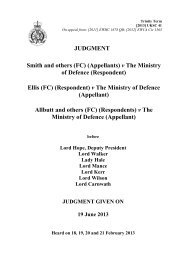
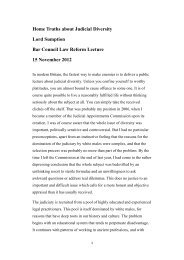
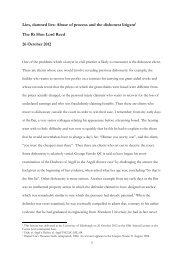


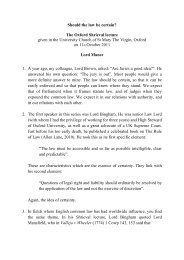
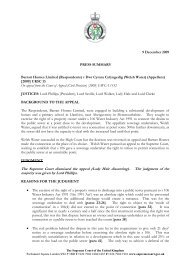

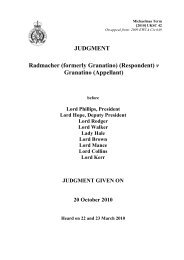
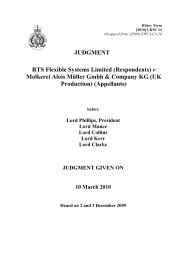
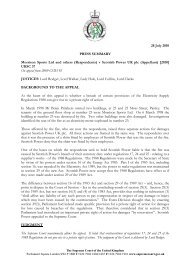
![[2009] UKSC 10 - The Supreme Court](https://img.yumpu.com/8582038/1/184x260/2009-uksc-10-the-supreme-court.jpg?quality=85)
